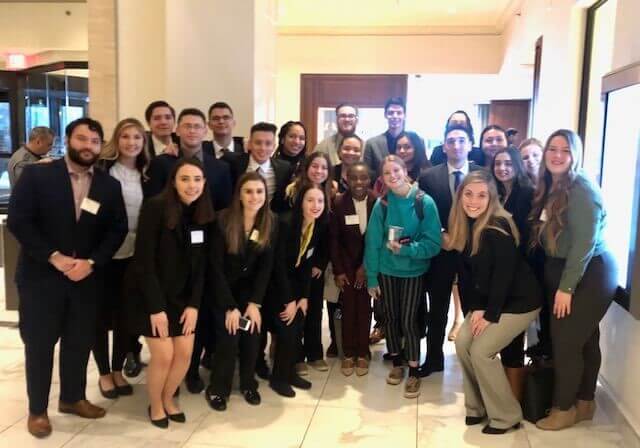From Oct. 6-9, Monmouth University’s Model United Nations (MUN) team competed in the Boston Regional Conference, referred to as BarMun. The conference took place in Boston’s Park Plaza Hotel, and schools including Georgetown, the University of Chicago, American University, the Naval Academy, alongside others, competed at the conference.
Monmouth University’s delegation consisted of ten people representing countries such as the Republic of Argentina and Hungary on a variety of topics. These range from environmental issues, fighting poverty, protecting human rights, and other issues traditionally seen as part of the UN’s scope of work.
Nick Yalch, a senior business student and Captain of the Model UN Team, was Monmouth’s head delegate for the conference.
Monmouth’s delegation didn’t come home empty-handed. Duo James Bellinger, a sophomore political science student, and Oliver Gaines, a senior history student, both won speaking awards for their speeches in committee. Gaines and Bellinger represented Hungary in the General Assembly, which at BarMun was the largest committee with 85 delegates.
Catherine Melman-Kenny, a senior anthropology and political science student and member of the Model UN team, summarized MUN as “an activity that encourages students to think critically about how to solve world issues, to understand how different nations would go about these solutions, and to work diplomatically with other students. It provides you the opportunity to travel and see new places across the country and world.”
Eric Machnicki, a senior political science student who at BarMun represented Argentina on the historical 1972 UN Stockholm Conference on the Human Environment Committee, provided an in look to the experience at the conference. Machnicki said, “I feel that the purpose of MUN is to come to a more complete understanding of the world. Whether it be by talking to other delegates, learning something new during research, or becoming a better writer, I’m always broadening my scope of knowledge…nothing exercises the mind better than academic competition, it really forces you to think.”
Concerning the educational aspects of MUN, Machnicki said, “[I’m] always learning during MUN. Research for a conference requires a delegate to read and be able to articulate in a contested setting with a lot of complicated information. I think Model UN more than any of my classes has taught me how to put together a coherent research strategy.”
Conferences often feature participation from schools that come from abroad. Many delegates expressed their appreciation for working with foreign delegations, as it broadens their worldviews and fosters understanding between peoples. Machnicki elaborates on this, saying he “[I] really enjoy the opportunity to talk to a diverse range of people from all over the country and many times internationally,” Machnicki said.
Thomas Rosta, a junior political science student who was a member of the Advanced Crisis Committee at BarMun, provided a glance into how the team functions and where he thinks they can improve. Rosta said, “We need to work on our recruiting and planning for committee. MUN requires nothing to be pre-written; however, it should be noted that many come into the conferences with plans in their head. I think Monmouth needs to work on that.” When it comes to what Monmouth does right, Tom expressed confidence in the head delegates and the team’s faculty advisors.
Melman-Kenny pushed back on this notion, saying, “Our team researches a lot on the topics we get and prepare ideas for successful clauses that allow our ideas to dominate the resolutions at MUN.” She also said that MUN is a successful demonstration of how cooperation in events like these can translate into success in the real world.
Traveling to new cities is a key part of the MUN experience and a leading factor behind its cemented spot as one of the most popular extracurricular for both college and high school. Rosta said that his favorite part of the experience was visiting Boston. “A friend and fellow Monmouth student and I…went around to see Chinatown,” he said. “We stopped in this place for food which was the size of a dorm room and it has been some of the best Chinese food I have ever had. It’s stuff like that that really keeps me wanting to do MUN.”
James Bellinger, the aforementioned award winner and sophomore political science student, highlighted the importance of the club to MU. Bellinger said, “This club means a lot to Monmouth University. Winning awards is of course fulfilling, but it also puts Monmouth on the map as a competitive school at these conferences. Monmouth—like any school—wants to have a high rate of graduates that enter careers post-graduation, making this club a great resume addition.”
Monmouth’s MUN team will be competing next month in the Oxford Conference in the United Kingdom and the Washington Conference in Arlington, Virginia.


